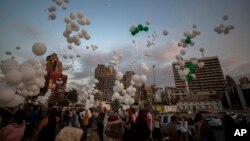The investigation into last year’s massive explosion in Beirut has been slow due to what observers say is interference by the powerful Iran-backed Hezbollah group. Lebanese judge Tarek Bitar has survived two removal attempts. The latest was Monday when a court dismissed complaints against Bitar, but Hezbollah continues to oppose him and the probe he is conducting. Observers say a real national front is needed to confront obstacles posed by Hezbollah, while getting Lebanon on track to start needed economic and political reforms.
Bitar has faced pushback from powerful Lebanese factions trying to stop his investigation into the August 4, 2020, Beirut port blast, one of the biggest non-nuclear explosions in history. Reports said a huge quantity of ammonium nitrate - commonly used to make fertilizer or bombs - was left unsafely stored there for years.
Three former ministers of interior, finance and transport, are defendants in the case and allied to Hezbollah, the country’s powerbroker. They tried to get Bitar removed from the probe as he has sought to question them. Hezbollah’s chief, Hassan Nasrallah, accused Bitar of being “politicized,” despite having a position that is considered neutral. Hezbollah security officer Wafiq Safa warned the judge that if the group did not like his legal work, he would be removed.
He would be the second judge dismissed.
Political analyst Dania Koleilat Khatib with the Issam Fares Institute at the American University of Beirut told VOA why she believes Hezbollah is threatening Bitar with removal.
“Hezbollah always tries to intimidate because probably he is going to unveil something that they don’t want him to unveil. That’s why they are trying to block him," she said. "Did they store the nitrate? Did they not store it? The fact that they told him to stop and sent him this message shows that they really feel threatened by the investigation.”
Another former interior minister, Ahmed Fatfat, told the Saudi Arab News daily that Hezbollah’s actions suggest it is afraid of the developments taking place.
“Hezbollah accuses all those who disagree with it of treason, while it admits that it receives its orders and money from Iran,” Fatfat said. He said that unless a real national front is established to confront the party, the country will fall under Iranian occupation.
Many Lebanese, especially families of the more than 200 blast victims, are furious that no senior official has been held accountable for the tragedy more than a year on.
The position of Bitar is important," said Analyst Dania Koleilat Khatib. "The Lebanese people are so demoralized. When I saw the parents of people who died 4th of August, someone speaking in their name, he said though ‘we don’t believe in the government, the judiciary has showed us that despite everything, justice can still emerge’ and this is very important. This is where the international community, the EU, the US should support someone like Bitar; should make sure that he will not be subject to political pressure and should send this very strong message not only to Hezbollah, to anyone that if anyone touches him, they will be subject to very strong punishment.
The probe has been the subject of international criticism.
Human Rights Watch and Amnesty International have accused Lebanese authorities of brazen obstruction of justice and of callous disregard for victims' families as the probe drags on.




